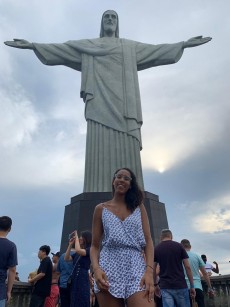Notes from Abroad: Paula in Brazil
 Paula Pelletier
Paula Pelletier
Paula Pelletier ’21, a Sociology and Anthropology major, is studying at the Fundacao Armando Alvares Penteado in Sao Paulo, Brazil.
E aí, gente? I would have never thought I would say yes to putting a flamboyant costume on and dance-walking alongside a samba music truck trio at 10 a.m. under the summer sun, until this study abroad experience.
My name is Paula and I’m a Sociology and Anthropology major from the Dominican Republic. I was so impacted by my first proper winter (ever) in Lake Forest that I decided to run away from the cold for a semester to Brazil, and now I am doing a flexible course program at Fundação Armando Alvares Penteado in São Paulo. Not only did I get to finally live in Brazil, but I got to live in Brazil during Carnival season. And let me tell you that what is usually shown in movies and social media is not true… it is an understatement. Being part of this cultural tradition was not only an extremely fun way to meet local people and explore the streets of São Paulo and Rio de Janeiro, but a way to understand Brazilian identity and expression, social dynamics, and cultural norms.
However, being in Sao Paulo, a city that is home to Brazilians of all states, also made me realize that Brazil is also much more than just Carnival; it was not until I stepped in the middle of Paulista Avenue on the day I arrived that the immensity of Brazil hit me. Coming from a very small island and moving to the small community of Lake Forest, I was faced for the first time with a truly cosmopolitan city, where one feels minuscule and a part of a diverse totality at the same time. I have been in São Paulo for a little bit over a month, and I have yet to even completely explore my nearest neighborhoods and try all the mouth-watering food! The independence needed to get in the flow of a city like São Paulo has been extremely formative, and this different way of living, both inside and outside the classroom, has challenged me to become more agent, flexible and to reflect on my own perceptions of social interactions.
I cannot give enough thanks to Ingrid H. and George L. Speros and ISEP, for if it weren’t for their scholarship and their generosity, the experiences I’ve lived and have yet to experience abroad would not be possible.